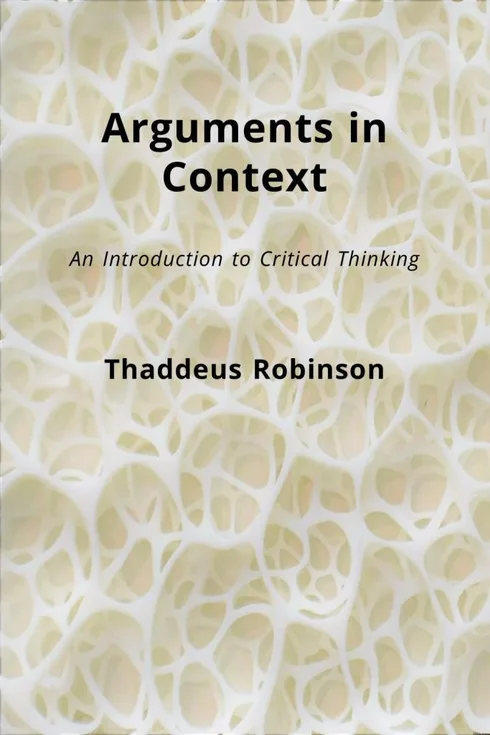
Arguments in Context
![]()
![]()
![]()
![]()
![]()
Thaddeus Robinson, Muhlenberg College
Copyright Year:
Publisher: Muhlenberg College
Language: English
Formats Available
Conditions of Use
![]() Attribution-NonCommercial
Attribution-NonCommercial
CC BY-NC
Reviews
Reviewed by Sarah Lonelodge, Assistant Professor of English/Writing Program Director, Eastern New Mexico University on 12/19/23
Robinson presents a very comprehensive text focused on critical thinking and the analysis and evaluation of arguments. Numerous forms of argument are presented, and the author offers useful tools that students will be able to apply. The text does... read more
![]()
![]()
![]()
![]()
![]()
Reviewed by Sarah Lonelodge, Assistant Professor of English/Writing Program Director, Eastern New Mexico University on 12/19/23
Comprehensiveness
Robinson presents a very comprehensive text focused on critical thinking and the analysis and evaluation of arguments. Numerous forms of argument are presented, and the author offers useful tools that students will be able to apply. The text does not offer students explicit instruction in creating or writing arguments, but this goal is not mentioned as one of the aims of the text. However, it is clear that students would be able to develop thoughtful arguments after reading and interacting with this text. While an index/glossary is not provided, the author presents a summary and key terms in a summary portion for each section.
Content Accuracy
The content looks accurate and unbiased to me. Robinson provides a thorough discussion of various methods and possibilities for argument identification, analysis, and evaluation. The examples employed throughout the chapters tend to be based on very neutral situations.
Relevance/Longevity
Because the text is focused on critical thinking, I do not see it becoming obsolete any time soon. Perhaps a few of the examples will eventually need updates, but most are fairly timeless. Robinson also presents an effective discussion of media literacy with social media and web-based arguments. Again, this presentation is effective; however, the growth of social media and the expansion of platforms and apps will require updates in the near future to maintain relevance.
Clarity
The content of the book is clear and well organized; however, some terminology may be difficult for some students to grasp easily. Depending on the level of student who is using this text, the language may not be an issue. For first- or second-year students, the style and word choice may cause some frustration or may require the use of a dictionary.
Consistency
The book is very consistent in its use of language, examples, etc., and its organization/framework is easy to navigate. From chapter to chapter, students will know what to expect.
Modularity
I think the book is well modulated. Robinson has created seven distinct units or sections, and each of them have 3-5 chapters of relatively similar length. The length may feel a bit long for some readers, but this determination will depend on the level of student assigned this text.
Organization/Structure/Flow
Each unit/section is well organized into a text overall and would flow well from one concept to the next. Within each unit/section, the chapters follow a similarly effective organization pattern. I particularly appreciate the summaries at the end of each unit/section as these additions would likely offer students a clear picture of the outcomes of what they read.
Interface
I don't see any interface or navigation issues. The display is well organized and easy to follow and read.
Grammatical Errors
I didn't notice any grammatical issues.
Cultural Relevance
I did not notice any culturally insensitive or offensive content. The few images used were neutral and typically more decorative than content specific. The examples utilized through the book were based on concepts that are unlikely to offend anyone, such as a sibling borrowing a vehicle, sports, calculating GPA, and similar topics.
CommentsI think this book would be very useful for upper-division college courses in which students would need to identify, analyze, and evaluate arguments. The text is very specific about types and uses of argumentation, and Robinson provides a number of quick, illustrative examples that would likely help readers comprehend the concepts presented.
Table of Contents
- I. An Introduction to Reasoning
- II. Argument Analysis
- III. An Introduction to Evaluation
- IV. An Introduction to Deductive Arguments
- V. Common Inductive Arguments
- VI. Social Arguments
- VII. Scientific Reasoning
About the Book
Arguments in Context is a comprehensive introduction to critical thinking that covers all the basics in student-friendly language. Intended for use in a semester-long course, the text features classroom-tested examples and exercises that have been chosen to emphasize the relevance and applicability of the subject to everyday life. Three themes are developed as the text proceeds from argument identification and analysis, to the standards and techniques of evaluation: (i) the importance of asking the right questions, (ii) the influence of biases, cognitive illusions, and other psychological factors, and (iii) the ways that social situations and structures can enhance and impoverish our thinking. On this last point, the text includes sustained discussion of disagreement, cooperative dialogue, testimony, trust, and social media. Overall, the text aims to equip readers with a set of tools for working through important decisions and disagreements, and to help them become more careful and active thinkers.
About the Contributors
Author
Thaddeus Robinson. Associate Professor of Philosophy, Muhlenberg College
